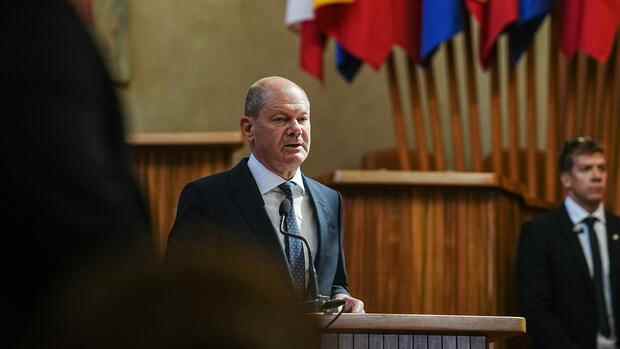At Charles University, the Chancellor outlined his ideas for reforms for the European Union.
(Photo: dpa)
A jerk will not go through Europe like this. With his keynote speech in Prague, Olaf Scholz gave a few pointers as to how he envisioned the reform of the EU. He didn’t reveal a vision – and also no way of breaking down the internal resistance to reforms.
Due to the unanimity principle, the EU Council is often unable to make decisions. However, nobody relinquishes their right of veto simply by persuasion.
The status of the discussion is disappointing. Efforts to reform the EU have been going on for years. But little has happened, despite the fact that some of the solutions are obvious, despite the fact that French President Emmanuel Macron once made it his main topic and despite the citizens’ conference on the future of Europe producing clear results.
Governments are to blame for this if they do the opposite of what is recognized as correct in the other EU states, out of short-term calculations or for domestic political reasons.
Top jobs of the day
Find the best jobs now and
be notified by email.
Hungary is currently the biggest problem and will remain so for a while. The Hungarians have just strengthened their right-wing populist Prime Minister Viktor Orban in the election. But Germany, too, has destroyed some cohesion with its short-sighted energy policy geared towards Russia.
Not enough substance for a major EU reform
Now Scholz is spreading his arms and wants to bring together the different interests in the EU. That’s right and worth every try. However, it is questionable whether this will result in a major EU reform.
After all, the chancellor brought a concrete offer with him to Prague: he wants to make Germany a location for anti-aircraft missiles that can also protect other countries. And he invites the neighboring countries to participate in the system. In the end there could be an integrated, pan-European air defense system.
This is not only associated with a direct benefit for the partner countries, it also follows the principle through which much has recently been achieved in Europe: those who have common interests move forward together without waiting for the others.
That is not the pure lesson of European integration. Scholz himself warns against “progressing in ever more diverse groups” and “wild growth”. But wild growth is better than no progress at all.
The Chancellor wants to make new efforts to finally resolve some of the old conflicts: the dispute over migration policy, the unresolved issue of new debt rules, the processes of disintegration in the constitutional states of Poland and Hungary.
It’s definitely worth trying again. But there will not be a major jolt in which the EU states agree on a joint restart. It is all the more important that the conflicts do not result in progress being held up in other fields.
More: Olaf Scholz offers neighboring countries joint air defense
